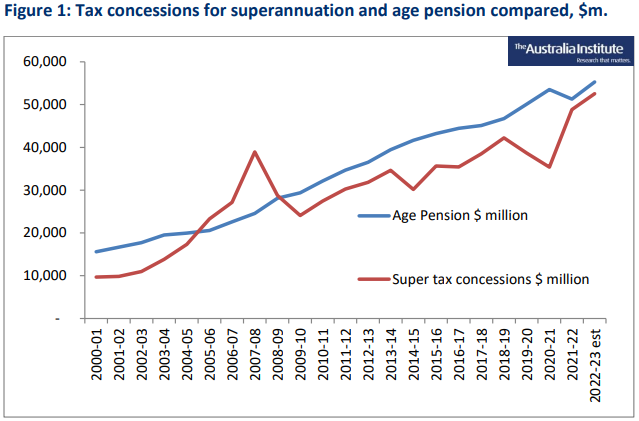Super tax breaks for mega-rich to cost $53 billion as calls for reform grow
Australia’s superannuation tax concession scheme will cost the 2022-23 budget a whopping $52.6 billion, more than the entire National Disability Insurance Scheme and on par with the age pension program’s $55.3 billion price tag, public policy think tank The Australia Institute said in a report released February 3.
In the report, Self-funded or state-funded retirees? The cost of super tax concessions, Australia Institute executive director Richard Denniss (pictured) and senior research fellow David Richardson noted that Assistant Treasurer Stephen Jones has indicated government plans to introduce legislative reform around superannuation, with a broad swathe of stakeholders supporting tighter rules.
“If the goal of superannuation is to shield the federal budget from the cost of providing an aged pension, the reality is that the system is more successful in boosting the savings of the wealthiest Australians than it is in protecting the taxpayer,” the report stated.
Recent data from the Australian Taxation Office shows 897 self-managed super funds (SMSFs) now produce income of at least $1 million, with some worth hundreds of millions – the largest fund is currently worth $401 million.
“This data shows the idea of ‘self-funded’ retirees is a misnomer,” Denniss said. “There are now two classes of state-funded retirees in Australia, both costing the taxpayer roughly the same amount: those living on the age pension, and a smaller group of wealthy account holders with lavish tax loopholes.”
‘Lucrative tax avoidance facility’
By tightening the rules governing tax concessions for the minority of ultra-wealthy accounts, the government could save billions of dollars, the report stated. In addition to Treasury flagging potential reform, it noted, even super industry leaders support bolstering the rules.
The superannuation program was intended to serve as an alternative to the age pension to remove pressure from the budget while enabling Australians to live comfortably in retirement, but it has amounted to a “lucrative tax avoidance facility” for the very rich, Denniss said.
The $52.6 billion price tag in the budget puts super tax concessions in the top three expenditure programs by cost, and it dwarfs the programs below it: funding the NDIS costs $35.5 billion, followed by medical benefits at $31.3 billion and state assistance for hospitals at $26.6 billion.
The report also noted that the cost of super tax concessions is very volatile, with year-to-year fluctuations sometimes topping $10 billion (see chart). Concessional treatment of income earned in superannuation funds varies with the sharemarket performance.

“Reasonable people will disagree about the role of super in modern Australia, but this data shows an unsustainable system with a small number of account holders reaping the benefits,” Denniss said. “This was never the purpose of superannuation.”
Among the “major changes” required to improve the system, the Australia Institute report suggested abolishing concessions for those with super balances that exceed the eligibility threshold for the age pension. “This would lead to significant budgetary saving, significantly reduce wealth inequality, and significantly increase the ability of the Commonwealth government to invest in solutions for other policy problems,” the report stated.
“For years, dating back to the Murray Review in 2014, governments from all sides have attempted to fix super concessions to make them responsible and sustainable,” Denniss said. “In the current fiscal environment, this data shows the reform job remains incomplete.”











